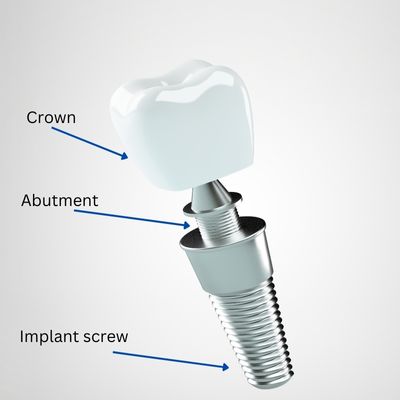My bite is off with my new three dental implants. I had three missing teeth from my first premolar back that my dentist replaced with dental implants last July. Now that I have the permanent crowns, I told my dentist that my upper and lower left teeth don’t match when I bite down. The upper teeth are too far left of the lower teeth. I saw my dentist for an adjustment three weeks ago, but I am unsure what he adjusted. I do not notice any difference, though. I am worried about how many adjustments my dentist can make before my crowns or implants fail. I don’t know what to do. – Thank you. Kevin D. from OK
Kevin,

Get a second opinion to determine why your bite is off with dental implants
Thank you for contacting our office. Dr. Delaune would need to examine your crowns and implants and take x-rays to determine what is affecting your bite. But it is not okay to experience discomfort after getting your implant crowns.
What Causes Occlusion (Bite) Problems with Dental Implant Crowns?
If you have concerns about your bite (how your upper and lower teeth meet) with new dental implant crowns, the cause may include one or more of the following:
- Incorrect dental implant placement – When a restoring dentist (who provides the dental crowns) provides clear communication to an oral surgeon or periodontist, it ensures precise implant placement. Skilled restoring dentists provide a surgical guide that defines implant location angle. Without specific instructions, misplaced dental implants can disrupt your bite. Some dentists have advanced training in implant surgery, providing both the implants and dental crowns for a smooth process.
- Incorrect crown restoration – A dental crown must precisely fit the connector on top of a dental implant. If a crown doesn’t fit well, it will affect how your upper and lower teeth meet (your bite).
- Bruxism – Teeth grinding adds stress to dental implants and can disrupt harmony between your implants and crowns.
- Incompatible dental crown and implant size – When a dental implant is too long or too short for the crown attached, it will affect your bite. The same applies if the crown is out of proportion to the implant size.
The July 2019 issue of the International Journal of Implant Dentistry published an article on occlusal overload with dental implants. According to the report, when the bite force on dental implants is too strong, it may lead to irritation in the gum tissue around the implants (peri-implantitis), which affects the bone if left untreated. So, we urge you to seek a qualified dentist.
We recommend scheduling an exam with a restorative dentist with advanced dental implant, cosmetic dentistry, and occlusion and bite training. A prompt examination and treatment will help prevent further irritation to the gum tissue and bone around the dental implants.
Metairie, Louisiana, dentist Dr. Duane Delaune sponsors this post.
